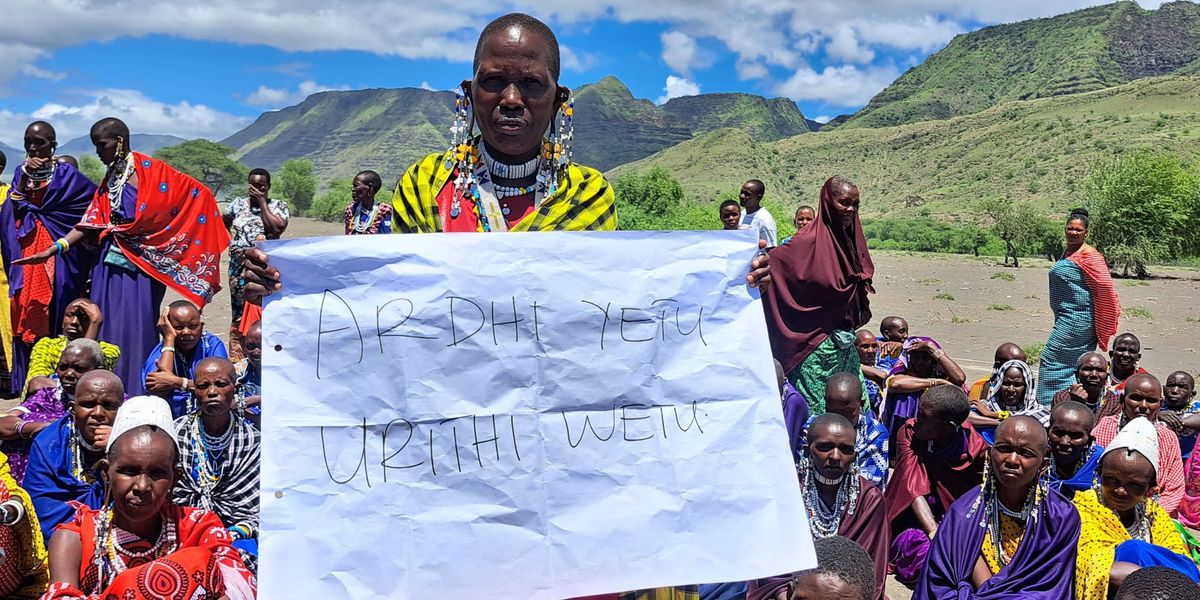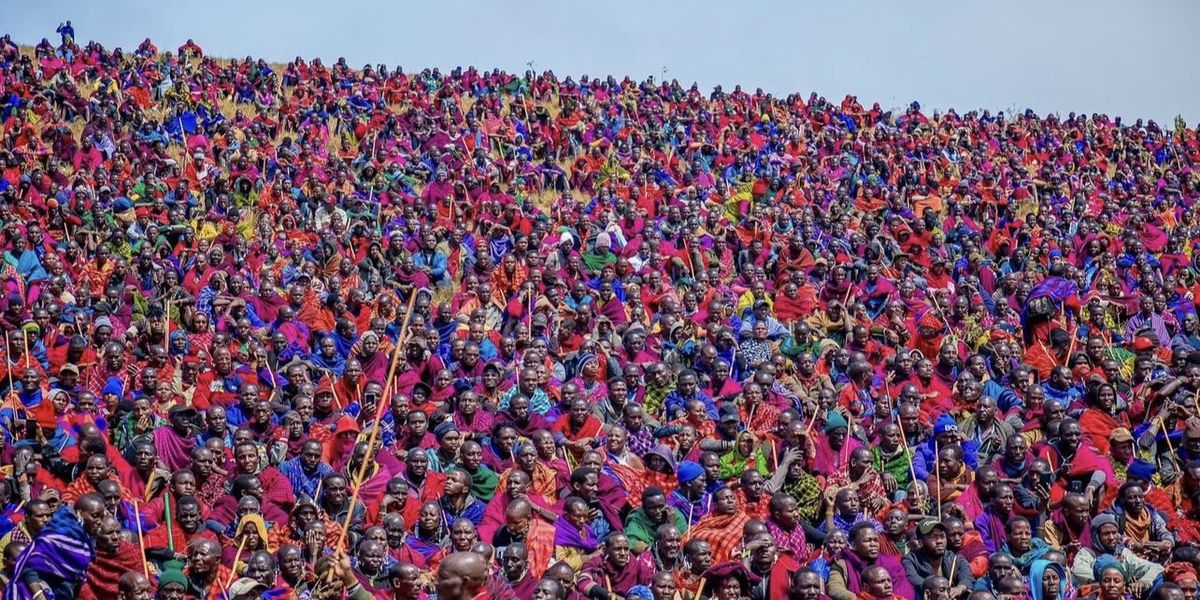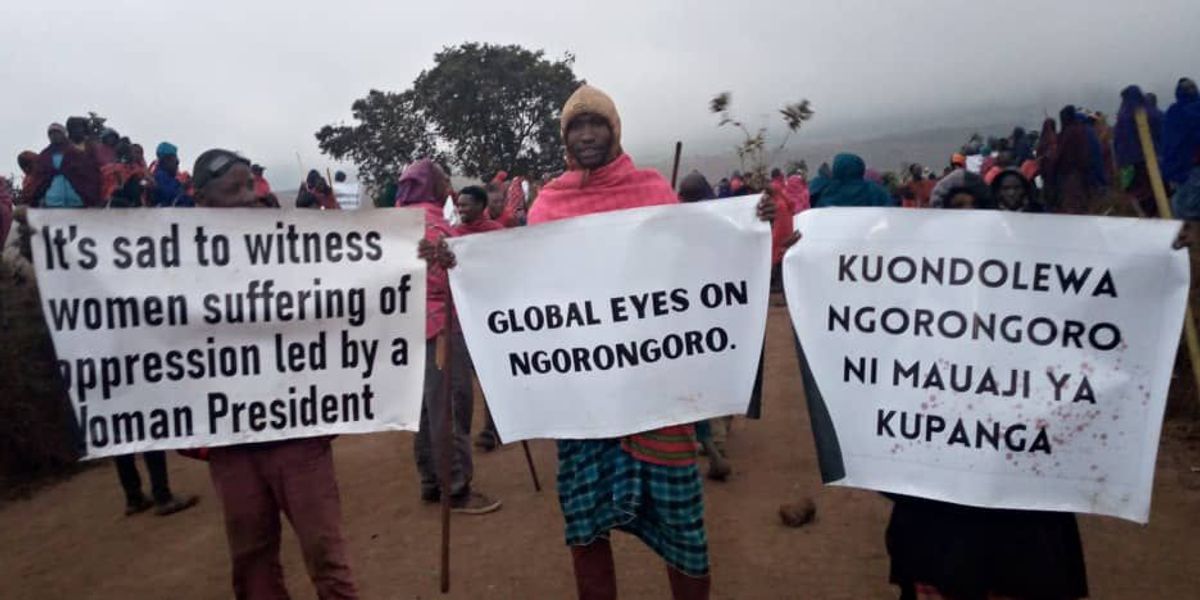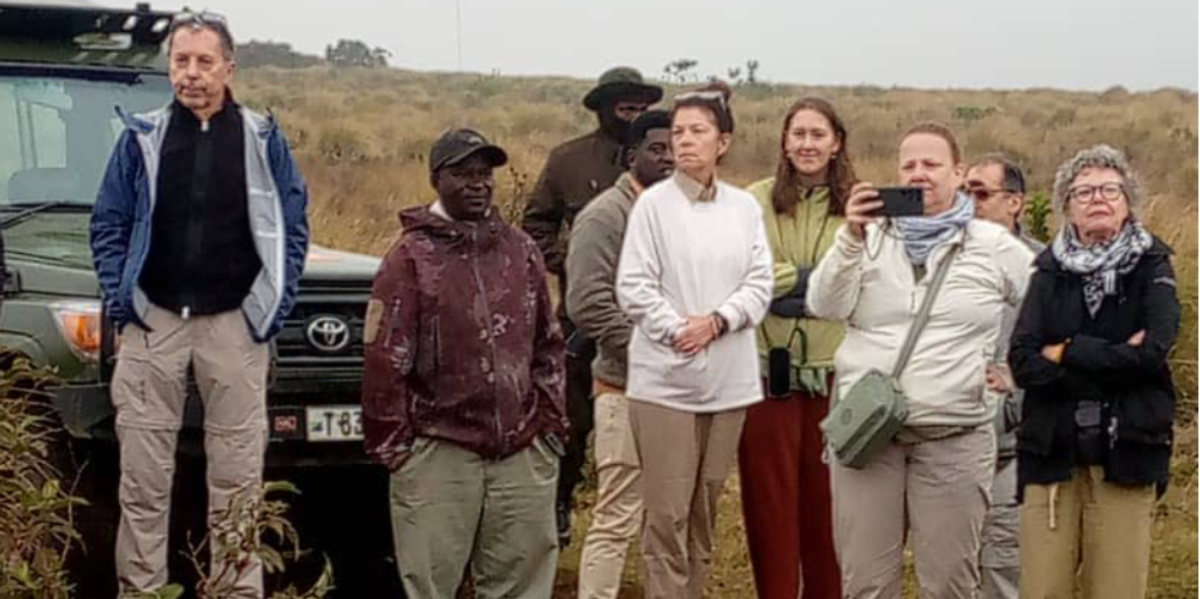

SUBSCRIBE TO OUR FREE NEWSLETTER
Daily news & progressive opinion—funded by the people, not the corporations—delivered straight to your inbox.
5
#000000
#FFFFFF
To donate by check, phone, or other method, see our More Ways to Give page.


Daily news & progressive opinion—funded by the people, not the corporations—delivered straight to your inbox.
If designating areas as World Heritage Sites endangers the survival of Indigenous peoples in African countries, UNESCO and IUCN’s outdated, colonial, and top-down approach to conservation must be dismantled immediately.
In the early morning of August 18, the safari cars that usually creep along the Ngorongoro-Serengeti highway, slowed by their sheer numbers, encountered a different challenge. Thousands of Maasai men and women, draped in red-patterned Shuka cloth and waving grass, a symbol of peace, were blocking the highway.
They were staging a peaceful protest against the Tanzanian government’s latest ruthless attempt to forcibly evict them from their ancestral lands. The police, wary of using violence in front of international tourists as they had in neighboring Loliondo in 2022, resorted to intimidation tactics instead, blocking vehicles carrying food and water from Karatu to the Ngorongoro Conservation Area (NCA) to weaken the resolve of the demonstrators.
“We are not blocking this highway out of choice. We are doing it for necessity. For too long our voices have been ignored, and out rights have been trampled. This is our last resort.”—Statement of the Maasai Community, NCA, August 18, 2024

A Maasai woman holds a sign reading, “This is our ancestral land.” (Photo: The Maasai elders, NCA)
Since Tanzania’s colonizers established the Serengeti National Park in 1951—displacing Indigenous residents to Loliondo and the Ngorongoro Conservation Area (NCA)—the pastoralist Maasai in Northern Tanzania have faced relentless struggles against evictions and human rights abuses. For the past four years, their resilience has endured brutal attacks designed to expel them from their ancestral lands, transforming the region into a people-free zone to enhance safari tourism and hunting, as glorified in Western media like Planet Earth. These atrocities are masked as environmental conservation and protection.
In April 2021, the Tanzanian government announced the Multiple Land Use Management Plan (MLUM), posing a grave threat to the Maasai’s survival in the NCA. This followed the March 2019 joint monitoring mission by the UNESCO World Heritage Centre (WHC), the International Union for Conservation of Nature (IUCN), and the International Council on Monuments and Sites (ICOMOS), which urged the government to control population growth in the NCA. The government responded by prioritizing tourism revenue, enacting the MLUM and a resettlement plan that expanded the NCA from 8,100 square kilometers to 12,083 square kilometers and created new restricted areas. In essence, this condemned nearly 80,000 Maasai to lives of destitution or death through forced evictions and the destruction of their livelihoods.
“The evictions and restrictions constraining tens of thousands of livelihoods are not about ensuring conservation but about expanding tourism revenues within the World Heritage Site. Tourism within the NCA has exploded in recent years with the number of annual tourists increasing from 20,000 in 1979 to 644,155 in 2018, making it one of the most intensively visited conservation areas in Africa. The number soared to 752,215 in 2023.”—The Oakland Institute

Maasai mobilize for their political rights. (Photo: The Maasai elders, NCA)
In response to international condemnation, the government falsely claimed that Maasai were volunteering en masse for resettlement at two relocation sites—Msomera village in Handeni district and Kitwai A and B villages in Simanjiro district. The flawed resettlement plans forced 11,000 Maasai community members from the NCA to send a letter to the government and its main donors stating their demand to remain in the NCA.
“This is not the first time that we are fighting to secure our rights and protect the lives of our people—we need a permanent solution and we need it now. We will not leave; Not Now, Not Ever!”—A Letter from Maasai Community to Tanzanian Government & International Donors, 2022
Despite the government’s claims that the Maasai’s relocation is voluntary, they have been forcibly uprooted by a systematic denial of essential social services, including education and healthcare. In May 2024, the government slashed nearly half of the budget for Endulen community hospital, the main healthcare provider for nearly 100,000 Maasai pastoralists in the NCA. These cuts ended vital support for facility repairs and community health initiatives. The grounding of the Flying Medical Service in 2022, after 39 years of critical emergency care, left over 24,000 children unvaccinated, deprived more than 5,700 pregnant women of necessary medical attention, and halted the delivery of life-saving HIV medications. While no official count of fatalities exists, it is undeniable that lives have been lost as a result.

Maasai hold protest signs on the Serengeti-Ngorongoro highway. (Photo: The Maasai elders, NCA)
In August, after failing to forcibly remove the Maasai from the NCA, the government struck a severe blow to their political rights. Ngorongoro Division was removed from the voters’ register, disenfranchising tens of thousands of Maasai pastoralists ahead of the upcoming local and general elections in 2025. Those registered to vote saw their polling station moved hundreds of miles away to Msomera village—the site of their forced relocation—effectively stripping even more Maasai villagers of their right to vote.
Adding to this assault on their political rights, Government Notice (GN) 673, issued on August 2, 2024, delisted 11 wards, 25 villages, and 96 subvillages in Ngorongoro Division, affecting over 110,000 people, all without obtaining their Free, Prior, and Informed Consent. This blatant violation of their rights sparked the August 18 protest, where Maasai residents demanded the reversal of GN 673 and the restoration of their electoral rights by the National Electoral Commission.
“We urge the Minister of Local Government to revoke and cancel Government Notice No. 673 of 2024, as it violates the constitution, laws, and international and regional treaties that Tanzania has signed and ratified.”—Onesmo Olengurumwa, National Coordinator, Tanzania Human Rights Defenders Coalition
As images of the Maasai, armed with grass and placards, demanding justice, went viral on August 22, 2024, the Arusha High Court temporarily suspended GN 673, pending further instructions. However, community lawyers have condemned the ruling as a sham. The court’s decision followed an injunction supposedly filed by Ngorongoro resident Isaya Ole Posi, who denies any involvement. Allegations have surfaced that the government paid the lawyer who filed the injunction against itself, in a calculated move to divert international attention sparked by the protests.

Stranded tourists stand watching the Maasai protests. (Photo: The Maasai elders, NCA)
While the Tanzanian government must undoubtedly be held accountable for violating the rights of its citizens, we must also scrutinize the role of two other key actors. The first are international conservation bodies like UNESCO, IUCN, and ICOMOS, under whose influence the government’s Multiple Land Use Model (MLUM) and resettlement plan were developed. It took an extensive global campaign to shift their stance. UNESCO’s website carries the government’s February 2024 report on the conservation status in the NCA, providing the false narrative that the relocation of local communities is voluntary, adheres to international best practices, and includes compensation measures. Yet, it also notes ongoing concerns from local communities, acknowledging the need for a human rights-based approach.
If designating areas like the NCA as World Heritage Sites endangers the survival of Indigenous peoples in African countries, UNESCO and IUCN’s outdated, colonial, and top-down approach to conservation—while boosting tourism—must be dismantled immediately. These institutions have reluctantly admitted that the NCA’s multiple land use model is appropriate, rather than altering its protected area category with disastrous consequences for residents. However, they have ignored calls for the NCA to be delisted from World Heritage sites and failed to pressure the government to stop its human rights violations.
As for the international tourists who continue to flock to Tanzania, lured by the chance to witness the “Big Five” or hunt trophies, the August 18 protests should serve as a wake-up call. The Maasai protesters and their global supporters have made their message clear: This is no longer a scene from “Out of Africa.” If there is no respect for Indigenous lives, then it must be “Tourism out of Tanzania!”
"The arrest of climate activists against EACOP is a blatant move to silence crucial advocates for change," said Fridays for Future Uganda.
Police and soldiers from Uganda's U.S.-trained army cracked down on demonstrators at two Monday protests against the East African Crude Oil Pipeline, continuing the globally condemned oppression of EACOP opponents.
In the capital city of Kampala, where protesters tried to march on Parliament and the Chinese Embassy "there are 21 people arrested, they included 19 males and two females," defense attorney Samuel Wanda toldAgence France-Presse. They were taken to the city's central police station and charging details were not yet available. Eight protesters would be directly impacted by the project.
As AFP noted, the China National Offshore Oil Corporation has an 8% stake in EACOP, which is set to carry crude nearly 900 miles from Uganda's Lake Albert oilfields to the port of Tanga in Tanzania. Ugandan and Tanzanian state-owned companies each have a 15% stake, and the remaining 62% is controlled by the France-based multinational TotalEnergies.
"The arrest of Stop EACOP activists in Kampala today is an attack on democracy and the right to protest," said climate campaigner and environmental consultant Ashley Kitisya on social media. "We condemn this crackdown and call for the immediate release of all detained activists. Peaceful voices demanding justice must not be silenced. #StopEACOP."
Fridays for Future Uganda declared that "the arrest of climate activists against EACOP is a blatant move to silence crucial advocates for change."
"Many affected are misled and unaware of the true risks," the youth-led group added. "We must oppose this injustice and demand EACOP’s immediate halt to protect people and the environment."
Hundreds of peaceful pipeline opponents—including breastfeeding mothers—also gathered in Hoima City, according to the Kampala-based Monitor. They were at a Kitara Secondary School (SS) and planned to demonstrate at regional EACOP offices but "were surrounded by heavily armed police" and Uganda Peoples' Defence Forces (UPDF) soldiers "who foiled the protest."
As the outlet noted last year, declassified U.S. State Department data shows that from 2019-21, Uganda received $8.5 million in military training assistance from the United States, and from 2012-16, the African country got grants for equipment worth $21.9 million .
On Monday, Christopher Opio told Hoima Resident City Commissioner Badru Mugabi that the project affected persons (PAPs) he represents had not received a government response to an April petition "so, we decided to say we can again put our concerns in writing. Today, we were taking our petition to the offices of EACOP, and Petroleum Authority of Uganda (PAU) peacefully."
As the Monitor detailed:
Mugabi responded saying: "If you have a court case and the court has not heard you, please come to our offices. We shall put these courts to order, or we shall appeal to their supervisors. But walking to these offices will not change the status quo legally."
Later, Mugabi selected a few PAPs' representatives and escorted them to deliver their petition to the offices of EACOP and PAU while the rest of the aggrieved locals were left at Kitara SS under tight security.
In a series of social media posts, the StopEACOP campaign called out law enforcement for blocking the peaceful protest in Hoima, highlighting the threats and intimidation faced by PAPs and local climate activists.
Despite the oppression in Uganda, protests are planned in Tanzania on Thursday, according to the global climate organization 350.org.
"The EACOP project threatens local communities, water resources, biodiversity, and efforts to curb climate change while providing little to benefit ordinary Ugandan and Tanzanian people," the group said Monday. "Already, tens of thousands of people along the pipeline's route and near its associated oil drilling sites have been forcibly displaced, losing their land, livelihoods, and traditional ways of life. Many have been relocated to inadequate homes on infertile land, making it impossible to grow crops or sustain their families. Others have received inadequate compensation or none at all, leaving them unable to rebuild their lives."
"Additionally, community members and activists face escalating threats, including violence, intimidation, arrests, harassment, and even abductions for resisting the project," 350 added. "Impacted communities and land, human rights, and environmental defenders in the project's host countries are taking to the streets to demand an end to EACOP and justice for the harm that has already been caused."
"Speaking up for frontline communities should never lead to this," the #StopEACOP movement said following the release of Stephen Kwikiriza, who was held for a week for opposing the TotalEnergies/CNOOC-led project.
Opponents of a highly controversial oil pipeline under construction in East Africa on Monday demanded an investigation into the Ugandan army's treatment of an environmental activist who was hospitalized after allegedly being severely beaten while he was detained last week.
Stephen Kwikiriza, an activist with the Kampala-based Environmental Governance Institute (EGI), was found dumped on the side of a highway about five hours' drive from the Ugandan capital Sunday night following a weeklong detention by the country's army.
"Unfortunately, he is in poor condition after enduring severe beatings, mistreatment, and abuse throughout the week," EGI said, according toAl Jazeera. "Doctors are conducting various examinations."
Like other climate and environmental campaigners in the movement to stop the East African Crude Oil Pipeline (EACOP), Kwikiriza is believed to have been targeted for his activism against the project, which is being built by the French fossil fuel giant TotalEnergies in partnership with the China National Offshore Oil Corporation (CNOOC), the Uganda National Oil Company, and others.
The Paris-based International Federation for Human Rights (FIDH) said Kwikiriza was apparently abducted by Ugandan army officers in civilian clothes in what the group called a "particularly worrying escalation of repression."
FIDH said 11 activists have been "kidnapped, arbitrarily arrested, detained, or subjected to different forms of harassment by the Ugandan authorities between May 27 and June 5, 2024," part of what critics call a government campaign targeting StopEACOP campaigners that goes back years.
"Speaking up for frontline communities should never lead to this," the StopEACOP movement
said on social media following Kwikiriza's release. "We urge human rights organizations to hold Ugandan authorities accountable and ensure human rights and environmental defenders can work safely."
"We also ask TotalEnergies and CNOOC to investigate the injustices done in their names as alleged," the coalition added. "You can still make profits without harming communities or enabling human rights violations."
A senior Ugandan military official told Agence France-Presse that Kwikiriza "was taken into custody for questioning regarding his illegal activities, including mobilizing fellow activists to oppose the oil pipeline."
In a statement to
Reuters, TotalEnergies said Monday that the company "does not tolerate any threat or attack against those who peacefully defend and promote human rights."
If completed, the $3.5 billion, nearly 900-mile EACOP project is expected to transport up to 230,000 barrels of crude oil per day from fields in the Lake Albert region of western Uganda through the world's longest electrically heated pipeline to the Tanzanian port city of Tanga on the Indian Ocean.
A July 2023 report by Human Rights Watch (HRW) detailed how EACOP has devastated the lives and livelihoods of tens of thousands of people in its path while exacerbating the climate emergency.
"The Ugandan government needs to end its harassment of opponents of oil development in the country, such as the East African Crude Oil Pipeline Project, which has already devastated thousands of people's livelihoods in Uganda and, if completed, will displace thousands of people and contribute to the global climate crisis," HRW senior environmental rights advocate Myrto Tilianaki said in a statement issued during Kwikiriza's detention.